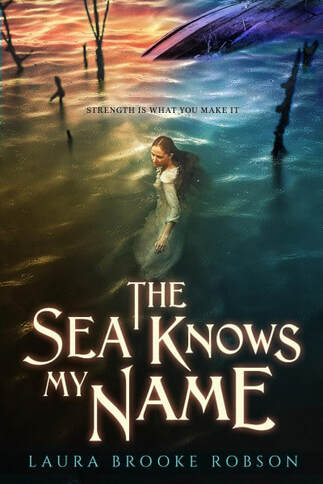
Thea Fowler was supposed to be as ruthless as her infamous mother, Clementine, has become. In the weeks, months, after the disaster that des-troyed her home, she was supposed to learn that the only way to have power in a world ruled by men is to take it for yourself. She was supposed to be audacious and commanding and stoic. She was supposed to be as terrifying and steely as Clementine herself, who has hardened in her resolve into the most dangerous pirate on the seas.
She was supposed to be just like Clementine, just like her mother, who has turned all her old pain and fury into becoming a person who men will have no choice but to listen to.
But all Thea has learned is that she will never live up to her mother’s ex-pectations—that, to her, she will always be weak. All she’s learned is that being Thea—quiet Thea, emotional Thea—will never be enough.
It should be easy: running away with a handsome boy who says he loves her for all the reasons Clementine has berated her all her life. It should be easy, making a new path for herself, away from the swaying decks and painful expectations of her mother’s ships.
Making a new path for herself. It’s what Clementine would have done.
But Clementine’s version of strength can only bring Thea so far when she has always failed at being her mother’s daughter. And when old and new betrayals crisscross through Thea’s life—most painfully of all, her own—she must find her own way of being strong.
I first read The Sea Knows My Name immediately after its release, and despite all my plans to the contrary, it kept me up far later than I intended, absorbed utterly in Thea’s world. But it took several months of thoughtful contemplation, and then a reread, for me to figure out how to properly write a review on it. Full of powerful, lyrical prose and realism so unshakable that it electrifies every sentence, this is one of the most stunning books I have read in years—and it took some time to decide how to write a review that would do it justice.
I utterly fell in love with this book. Robson (also the author of Girls at the Edge of the World) creates a world and a set of characters so vividly real it almost feels wrong to call this book fantasy. After all, this story is nothing like classic fantasy novels or even a typical pirate tale, full of swashbuckling triumphs, twinkling fairies, and the unmovable hand of destiny. Instead, it is nuanced, as quiet and emotional as its protagonist, and as thoughtful and powerful as Robson’s debut. Unconventional in the best possible way, this is a tale about family and stories, about the devastating expectations of a patriarchal world and the different kinds of strength it takes to live in it. Instead of falling into traditional patterns of storytelling and expectations concerning how women are treated and portrayed, The Sea Knows My Name actively stands up against them.
Thea defies and stands up to the expectations of her society without openly defying them, reminding the reader undeniably that there is more than one way to be a woman, and that being quiet or having feelings does not mean you accept or embody the expectations of a patriarchal society. Conversely, Clementine is in so many ways the classic YA fantasy heroine from the early 2010s—ruthless, determined, and feminist because she wants to set herself apart (the infamous ‘not like other girls’ trope). Thea openly defies this, contradicting the idea that one must be masculine and unemotional to be feminist, but in her own way, Clementine does not fall into the stereotype, either. They are, neither of them, wrong or stereotypical; instead, they are both strong in different ways, and Robson’s subtle yet determined way of weaving this thread and the contrast between them is utterly extraordinary.
With every plot twist and image, every line of dialogue, Robson builds a world and a story so spectacular that feeling ambivalent about this book is utterly out of the question. With vibrancy, realism, and a sometimes painful determination to tell the truth, she weaves something fulfilling out of Thea’s pain and conflict and all the patriarchy and control in the world, something that leaves the reader both empowered and deeply touched by the singular power Robson wields with this deceptively simple, lyrical novel. Raising questions about silence, freedom, love, power, strength, expectation, feminism, judgement, survival, and so much more, perhaps the starkest beauty of all in The Sea Knows My Name is its ability to weave so much together into a narrative that does not content itself with being simply ‘convincing,’ but is utterly real. We need more books with characters like Thea, and more writers as thoughtful and powerful as Robson. Devastating, beautiful, and full of deft realism, I highly recommend The Sea Knows My Name to readers ages thirteen and up.



 RSS Feed
RSS Feed
